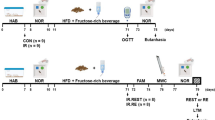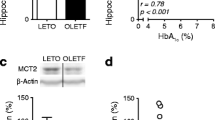Abstract
Type 2 diabetes (T2D) is a metabolic disorder that can lead to memory impairment. T2D main features are insulin resistance and hyperglycemia. Physical exercise is a non-pharmacological intervention that can regulate glycemic levels and fight insulin resistance in T2D, but whether it influences memory has been discussed. There are 2 main types of physical exercise: aerobic exercise and resistance exercise. Here, we review about the consequences of different physical exercise protocols on memory in diabetic subjects and animal models of T2D. Physical exercise, aerobic or resistance training, most of the times, is a capable agent to prevent and treat memory loss on diabetic subjects and animal models of T2D. However, whether aerobic and resistance training combined improve memory in subjects with T2D remains controversial. Regarding animal models of T2D, aerobic and resistance training have been showed to be capable to prevent and treat memory loss. Acute and chronic protocols of exercise, generally, induce positive physiological responses and adaptations in T2D, such as a better glucose control. The ideal physical exercise protocol that will produce the best benefits to diabetic subjects and to animal models of T2D has not been described yet. A variety of combination between intensity, volume, frequency, and duration of the physical exercise protocol on future studies is necessary to both diabetic subjects and animal models of T2D to determine the best protocol that will induce more benefits on memory in T2D.

Similar content being viewed by others
Data statement
Data sharing not applicable to this article as no datasets were generated or analysed during the current study.
References
Atkinson RC, Shiffrin RM (1968) Human Memory: A proposed system and its control processes BT - The Psychology of Learning and Motivation. Psychol Learn Motiv 2:89–195
Baker LD, Frank LL, Foster-Schubert K et al (2010) Effects of aerobic exercise on mild cognitive impairment: A controlled trial. Arch Neurol 67:71–79. https://doi.org/10.1001/archneurol.2009.307
Biessels GJ, Kappelle LJ (2005) Increased risk of Alzheimer’s disease in Type II diabetes : insulin resistance of the brain or insulin-induced amyloid pathology? Proteins Dis 1041–1044
Bordier L, Doucet J, Boudet J, Bauduceau B (2014) Update on cognitive decline and dementia in elderly patients with diabetes. Diabetes Metab 40:331–337. https://doi.org/10.1016/j.diabet.2014.02.002
Botta A, Laher I, Beam J et al (2013) Short Term Exercise Induces PGC-1α, Ameliorates Inflammation and Increases Mitochondrial Membrane Proteins but Fails to Increase Respiratory Enzymes in Aging Diabetic Hearts. PLoS One 8 https://doi.org/10.1371/journal.pone.0070248
Bourdel-Marchasson I, Lapre E, Laksir H, Puget E (2010) Insulin resistance, diabetes and cognitive function: Consequences for preventative strategies. Diabetes Metab 36:173–181. https://doi.org/10.1016/j.diabet.2010.03.001
Busquets O, Ettcheto M, Eritja À et al (2019) c-Jun N-terminal Kinase 1 ablation protects against metabolic-induced hippocampal cognitive impairments. J Mol Med 97:1723–1733. https://doi.org/10.1007/s00109-019-01856-z
Cassilhas RC, Antunes HKM, Tufik S, de Mello MT (2010) Mood, Anxiety, and Serum IGF-1 in Elderly Men Given 24 Weeks of High Resistance Exercise. Percept Mot Skills 110:265–276. https://doi.org/10.2466/pms.110.1.265-276
Cassilhas RC, Tufik S, De Mello MT (2016) Physical exercise, neuroplasticity, spatial learning and memory. Cell Mol Life Sci 73:975–983. https://doi.org/10.1007/s00018-015-2102-0
Cho JA, Park SH, Cho J et al (2020) Exercise and curcumin in combination improves cognitive function and attenuates ER stress in diabetic rats. Nutrients 12:1–14. https://doi.org/10.3390/nu12051309
Cotman CW, Berchtold NC, Christie L-A (2007) Exercise builds brain health: key roles of growth factor cascades and inflammation. Trends Neurosci 30:464–472. https://doi.org/10.1016/j.tins.2007.06.011
De Sousa RAL (2017) Brief report of the effects of the aerobic, resistance, and high-intensity interval training in type 2 diabetes mellitus individuals Diabetes mellitus. Int J Diabetes Dev Ctries 38:138–145. https://doi.org/10.1007/s13410-017-0582-1
De Sousa RAL, Torres YS, Figueiredo CPCP et al (2017) Consequences of gestational diabetes to the brain and behavior of the offspring. An Acad Bras Cienc 90:2279–2291. https://doi.org/10.1590/0001-3765201720170264
De Sousa RAL (2018) Gestational diabetes is associated to the development of brain insulin resistance in the offspring. Int J Diabetes Dev Ctries 39:408–416. https://doi.org/10.1007/s13410-018-0618-1
De Sousa RAL, Caria ACI, De Jesus Silva FM et al (2020a) High-intensity resistance training induces changes in cognitive function, but not in locomotor activity or anxious behavior in rats induced to type 2 diabetes. Physiol Behav 223:1–7. https://doi.org/10.1016/j.physbeh.2020.112998
De Sousa RAL, Hagenbeck KF, Arsa G, Pardono E (2020b) Moderate / high resistance exercise is better to reduce blood glucose and blood pressure in middle-aged diabetic subjects. Rev Bras Educ Física e Esporte 34:165–175
De Sousa RAL, Harmer AR, Freitas DA et al (2020c) An update on potential links between type 2 diabetes mellitus and Alzheimer’s disease. Mol Biol Rep. https://doi.org/10.1007/s11033-020-05693-z
De Sousa RAL, Peixoto MFD, Leite HR et al (2020d) Neurological consequences of exercise during prenatal Zika virus exposure to mice pups. Int J Neurosci 1https://doi.org/10.1080/00207454.2020.1860970
De Sousa RAL, Rodrigues CM, Mendes BF et al (2020e) Physical exercise protocols in animal models of Alzheimer ’s disease: a systematic review. Metab Brain Dis 1–11. https://doi.org/10.1007/s11011-020-00633-z
De Sousa RAL (2021) Animal models of gestational diabetes: characteristics and consequences to the brain and behavior of the offspring. Metab Brain Dis 2014–2019
Espeland MA, Lipska K, Miller ME et al (2017) Effects of physical activity intervention on physical and cognitive function in sedentary adults with and without diabetes. J Gerontol A Biol Sci Med Sci 72:861–866. https://doi.org/10.1093/gerona/glw179
Ferreira LSS, Fernandes CS, Vieira MNN, De-Felice FG (2018) Insulin resistance in Alzheimer’s disease. Front Neurosci 12:1–11. https://doi.org/10.1016/j.trsl.2016.12.005
Garber CE, Blissmer B, Deschenes MR et al (2011) Quantity and quality of exercise for developing and maintaining cardiorespiratory, musculoskeletal, and neuromotor fitness in apparently healthy adults: Guidance for prescribing exercise. Med Sci Sports Exerc 43:1334–1359. https://doi.org/10.1249/MSS.0b013e318213fefb
George EK, Hemachandra Reddy P (2019) Can healthy diets, regular exercise, and better lifestyle delay the progression of dementia in elderly individuals? J Alzheimer’s Dis 72:S37–S58. https://doi.org/10.3233/JAD-190232
Kitada M, Ogura Y, Monno I, Koya D (2019) Sirtuins and Type 2 Diabetes: Role in Inflammation, Oxidative Stress, and Mitochondrial Function. Front Endocrinol (Lausanne) 10:1–12. https://doi.org/10.3389/fendo.2019.00187
Lourenco MV, Frozza RL, de Freitas GB et al (2019) Exercise-linked FNDC5/irisin rescues synaptic plasticity and memory defects in Alzheimer’s models. Nat Med 165–175.https://doi.org/10.1038/s41591-018-0275-4
Olson EA, Mullen SP, Raine LB et al (2017) Integrated social- and neuro-cognitive model of physical activity behavior in older aduts with metabolic disease. Physiol Behav 176:139–148. https://doi.org/10.1016/j.physbeh.2017.03.040
Park H, Lee J, Cho H et al (2017) Physical exercise ameliorates mood disorder-like behavior on high fat diet- induced obesity in mice. Psychiatry Res 250:71–77. https://doi.org/10.1016/j.psychres.2017.01.012
Qaisar R, Bhaskaran S, Van Remmen H (2016) Muscle fiber type diversification during exercise and regeneration. Free Radic Biol Med 98:56–67. https://doi.org/10.1016/j.freeradbiomed.2016.03.025
Roden M (2012) Exercise in type 2 diabetes: to resist or to endure? Diabetologia 55:1235–1239. https://doi.org/10.1007/s00125-012-2513-5
Roriz-Filho JS, Sá-Roriz TM, Rosset I et al (2009) (Pre)diabetes, brain aging, and cognition. Biochim Biophys Acta - Mol Basis Dis 1792:432–443. https://doi.org/10.1016/j.bbadis.2008.12.003
Shima T, Matsui T, Jesmin S et al (2017) Moderate exercise ameliorates dysregulated hippocampal glycometabolism and memory function in a rat model of type 2 diabetes. Diabetologia 60:597–606. https://doi.org/10.1007/s00125-016-4164-4
Soares FHR, de Sousa MBC (2013) Different types of physical activity on inflammatory biomarkers in women with or without metabolic disorders: a systematic review. Women Health 53:298–316. https://doi.org/10.1080/03630242.2013.782940
Stefano F, Bianchini F (2011) On the historical dynamics of cognitive science: a view from the periphery. Early mechanisms and new Ideas, the search for a theory of cognition
Stomby A, Otten J, Ryberg M et al (2017) A paleolithic diet with and without combined aerobic and resistance exercise increases functional brain responses and hippocampal volume in subjects with type 2 diabetes. Front Aging Neurosci 9:1–10. https://doi.org/10.3389/fnagi.2017.00391
Tuomilehto J, Lindstrom J, Eriksson JG et al (2001) Prevention of type 2 diabetes mellitus by changes in lifestyle among subjects with impaired glucose tolerance. N Engl J Med 344:1343–1350
Funding
Coordenação de Aperfeiçoamento de Pessoal de Nível Superior (CAPES), Brazil—Finance Code 001.
Author information
Authors and Affiliations
Contributions
RALS wrote the manuscript; performed the literature research; analyzed and critically discussed the data; RCC analyzed and critically discussed the data; ACIC analyzed and critically discussed the data. The authors read and approved the final version of the manuscript.
Corresponding author
Ethics declarations
Ethical approval
This article does not contain any studies with human participants or animals performed by any of the authors.
Conflicts of interest
The author declares no competing interests.
Additional information
Publisher's Note
Springer Nature remains neutral with regard to jurisdictional claims in published maps and institutional affiliations.
Rights and permissions
About this article
Cite this article
De Sousa, R.A.L., Improta-Caria, A.C. & Cassilhas, R.C. Effects of physical exercise on memory in type 2 diabetes: a brief review. Metab Brain Dis 36, 1559–1563 (2021). https://doi.org/10.1007/s11011-021-00752-1
Received:
Accepted:
Published:
Issue Date:
DOI: https://doi.org/10.1007/s11011-021-00752-1




